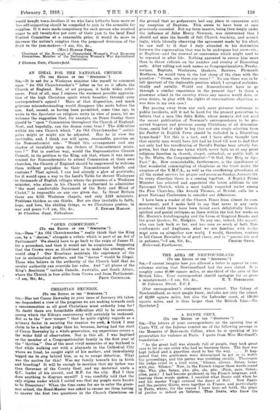CHRISTIAN REUNION.
[To TER EDITOR or THE " Sennseos."3 SIR,—Has not Canon Rawneley in your issue of January 5th taken too despondent a view of the progress we are making towards such a consummation as all good Christians must ardently long for? No doubt there are formidable difficulties still to be overcome, among which the Kikuyu controversy will certainly be reckoned. But as to the "new temper " that he quite rightly regards as a primary factor in securing the reunion we seek, 4 think I may claim to be a better judge than he, because, having had the start of Canon Rawneley by a whole generation, my experience covers a far wider field of observation. Nor is this all. I was baptized as the member of a Congregationalist family in the first year of the " thirties." One of the most vivid memories of my boyhood is that while walking out with a playmate in the Cathedral City where we lived, he caught sight of his mother, and immediately begged me to step behind him, so as to escape detection. What was the motive for this? Was my family beneath his in birth and breeding? It will be enough to mention that my father was then Governor of the County Gaol, and my maternal uncle a Q.C., leader of his circuit, and M.P. for the city. lied I then done anything to disgrace myself? I was candidly told that the only stigma under which I rested was that my people were known to be Dissenters! When the time came for me to enter the gram- mar school, the Heed-Master was asked to excuse me from having to answer the first two questions in the Church Catechism on
the ground that no godparents had any place in connexion with my reception of Baptism. This seems to have been at once graciously conceded. But my form master, being then deeply under the influence of John Henry Newman, was determined that I should not miss the benefit of full Church teaching, and accord- ingly, while literally observing the agreement made by his chief, he saw well to it that I duly attended to his distinction between the regeneration that was to be undergone but once—viz., at Baptism—and the renewal or conversion which might need to be repeated in after life. Nothing appeared to amuse him more than to throw ridicule on the number and rivalry of Dissenting sects. After rolling out such names as Congregationalists, Presby- terians, Baptists, Wesleyane, Quakers, Ranters, Plymouth Brethren, be would turn to the lost sheep of the class with the question : " Green, are there any more ? " No one there was to be left ignorant of the deplorable position which I occupied ecclesias- tically and socially. Would any Nonconformist have to go through a similar experience in the present day? Is there a grammar school in the country where any master would dare, or even desire, to play with the rights of conscientious objection as was done in my own case ?
But passing away from any such mere personal testimony to public incidents, will it not be hard for the present generation to believe that a man like John Kahle, whose memory did not need the recent publication of Newman's correspondence to be pre- served fragrant and precious among Christians of all denomina- tions, could feel it right to beg that not one single selection from his Psalter in English Verse should be included in a Dissenting hymn-book? Yet this is a fact, and I have often thought how that saintly man would have felt had he lived till now to find that not only had his versification of David's Psalms been utterly for- gotten, but that the one hymn which never fails us at any great religious function in church, chapel, cathedral, or pnb'ic hall, is by Dr. Watts, the Congregationalist—" 0 God, Our Help in Age, Past," &c. How unmistakable, furthermore, is the significance of that wonderful commingling of chaplains at the front under the auspices of the Y.M.C.A., as well as the overflowing attendance at all the united services for prayer and praise on Sunday, January 6th. In every direction there is a coming together. A Baptist Prime Minister has selected and appointed the latest addition to our Episcopal Church, while a most highly respected leader among the Free Churches, like Arnold Thomas, of Bristol, calls for a great National Conference to consider our differences.
I have been a reader of the Church Times from almost its com- mencement, and I make bold to say that never in any early number would there have been found such delightfully liberal- spirited and genial critiques as those within the last few weeks on Dr. Horton's Autobiography and the Lives of Stopford Brooke and the great Quaker, Dr. Hodgkin. To any one, indeed, like myself, who can look back so far, and has seen as much of both Non- conformists and Anglicans, what we are familiar with to-day mist seem an altogether new world. I would, therefore, venture to bid Canon Rawneley be of good cheer, and to " possess his soul


































 Previous page
Previous page